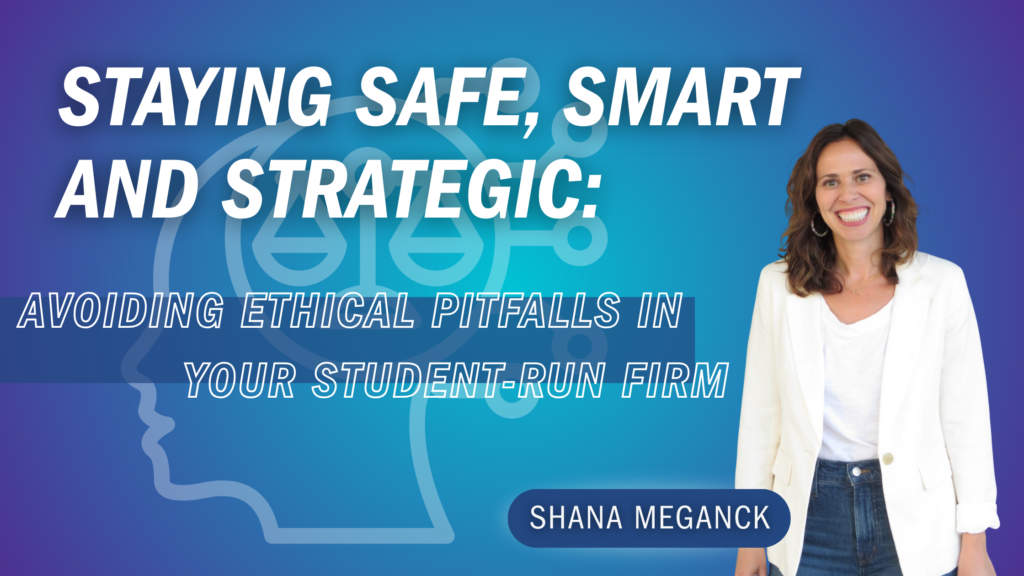Staying Safe, Smart and Strategic: Avoiding Ethical Pitfalls in Your Student-run Firm

Ethics are a regular topic in both our classrooms and our workplaces, so it’s no surprise they’re front and center in Student-run Firms, which sit right at the intersection of both. At James Madison University’s Student-run Firm, Bluestone Communications, we know properly handling ethical issues isn’t just about reacting whenever an issue pops up. As the Faculty Adviser, I’m always trying to think one step ahead and ask myself: How can we prevent ethical issues before they happen?
Here are a few strategies our Student-run Firm has used to keep ethics at the heart of our work:
- Build ethics into the onboarding process – especially for leaders. We kick off each semester with a leadership retreat for our new team leads. In addition to reviewing our processes and procedures, we dedicate time to openly discussing ethical scenarios and challenges leaders may face. Setting the tone for open and transparent communication early helps reinforce our expectations and standards.
- Share and regularly update a comprehensive handbook. We maintain a detailed handbook outlining all policies and procedures, which we review and revise annually. We also encourage open dialogue about ethical dilemmas during leadership and team meetings to keep the conversation active.
- Foster a no-judgement culture. We work hard to create an environment where students feel safe reporting ethical red flags without fear of retribution. This starts by building trust and normalizing ethical discussions between team members and with faculty leaders.
- Prepare clients to work with students. Before signing any contract, I meet with every client face-to-face. This allows us to vet potential clients and ensure they fully understand our structure and expectations. Setting the right tone early helps avoid misunderstandings down the line.
- Include ethical conversations in presentations throughout the semester. While onboarding is important, we also reinforce ethical thinking throughout the semester. We do this through presentations, guest speakers, and by analyzing real-world PRSA award-winning case studies that spotlight ethical decision-making.
- Organize a clear process for handling client issues before they become ethical concerns. We’ve built a multi-layered leadership structure and regularly revisit our approval and escalation processes with students throughout the semester. While students are encouraged to resolve issues independently, Faculty Advisers are always available to step in when needed.
- Monitor campaigns and content for accuracy and fairness: Clients review and sign off on all strategic plans before we begin work; however, we also implement regular internal and external check-ins throughout the semester to ensure transparency and accountability.
- Model transparency from the top: As faculty, we’re committed to being open, honest, and approachable. Modeling these values helps foster a culture where transparency is the norm, not the exception.
In public relations – especially in Student-run Firms – it’s easy to get caught up in deliverables and deadlines. Making space for ethical reflection isn’t just the right thing to do; it also assures we have a happy and productive firm that is preparing students for the future. At Bluestone Communications, building a proactive ethics culture has helped us not only avoid problems but earn trust from clients and confidence from our team.

Shana Meganck, Ph.D., is an Associate Professor in the School of Communication Studies at James Madison University. Her scholarly interests include public relations pedagogy and social responsibility. She is the Faculty Adviser of JMU’s Student-run Firm, Bluestone Communications, and brings industry experience working with a range of local and national clients in the public relations field.
